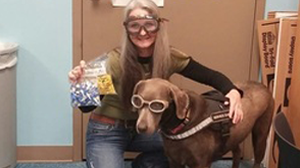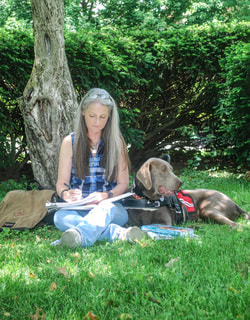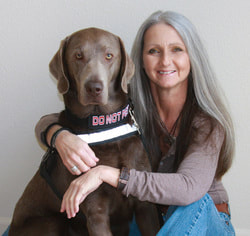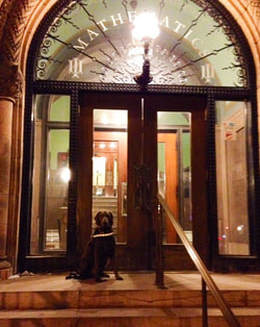SERVICE DOGS IN COLLEGE
By Joey
|
College can be a stressful time given the best of conditions. The course work is challenging and fast paced, college can be difficult to manage financially, the environment is hectic and many times classes are spread far apart over a large campus. In addition, there may be limited time to get from one class to another, through a thick mass of students in a hurry to get to a class, while socializing with each other or on cell phones.
So, why talk now about school when summer has just begun for many students? Returning to classes may be the last thing on your mind. But if you are going to attend college in the Fall with a service dog, now is the time to start planning and preparing for the first day of class. Even though Theo and I have been through a year and a half in a college setting as a team, we still take the summer months to review, train and practice. During this time we continue to visit the campus and walk the halls when the traffic is slower and visit with ODS (Office of Disability Services). When the course room location is posted, we visit each classroom with the instructor, to determine the best location for Theo so he is out of the way, and the best location for me with my post-traumatic stress disorder (PTSD). |
1) Is the dog a service animal required because of a disability?
2) What work or tasks has the dog been trained to perform?
Some may disagree with me on this, but I find having this discussion with every instructor before a class starts makes the transition into a new classroom environment more manageable for both Theo and I. I want to add that it is not required by law to register with the school's Office of Disability Services, but I make the choice to do so. I find that having a trained network of advocates behind me can be exceptionally helpful if I run into obstacles with either instructors, students or logistics in maneuvering the campus.
The benefit of having Theo with me everyday at school is immeasurable. Without him I am certain I would not have made it this far, nor would I have been as successful. My first semester returning to college at the age of 48 I was not accompanied by Theo. Suffering from severe Chronic Complex PTSD the semester was an endless cycle of panic and triggers. I would take the hallway with the least amount of people, skirting the walls with my head down trying to be as invisible as possible. I was continuously startled into total panic and dissociation by something as simple as a student coming around a blind corner. If anyone spoke to me I would freeze out of terror, and start shaking and crying, then panic and leave the building. I would sit alone under the stairwell out of sight between classes.
2) What work or tasks has the dog been trained to perform?
Some may disagree with me on this, but I find having this discussion with every instructor before a class starts makes the transition into a new classroom environment more manageable for both Theo and I. I want to add that it is not required by law to register with the school's Office of Disability Services, but I make the choice to do so. I find that having a trained network of advocates behind me can be exceptionally helpful if I run into obstacles with either instructors, students or logistics in maneuvering the campus.
The benefit of having Theo with me everyday at school is immeasurable. Without him I am certain I would not have made it this far, nor would I have been as successful. My first semester returning to college at the age of 48 I was not accompanied by Theo. Suffering from severe Chronic Complex PTSD the semester was an endless cycle of panic and triggers. I would take the hallway with the least amount of people, skirting the walls with my head down trying to be as invisible as possible. I was continuously startled into total panic and dissociation by something as simple as a student coming around a blind corner. If anyone spoke to me I would freeze out of terror, and start shaking and crying, then panic and leave the building. I would sit alone under the stairwell out of sight between classes.

Once Theo and I were paired together everything changed. Not only does he help regulate my PTSD but he helps by pulling me up stairs, as my left leg does not always cooperate, he balances me in the busy halls, he makes a path through crowds and he "blocks" by placing his body between myself and other people. He picks up items I continuously drop, since my left hand is limited in range of motion and strength, and my back injury prevents me from bending on some days. He has redirected me to a safe place when I was confused while dissociating or panicked, he alerts me when I am triggered so I can leave an area and so many other tasks. He has given me confidence and I now walk through the halls with my head up. Many of the students know us from being in a class together, or have just seen us so often, they wave and smile, sometimes Theo and I stop and chat. Administrators comment on the change they have witnessed in me over the course of two years. Not only am I the elected President of the colleges Club Access, the club whose mission is to educate the community and bring awareness to the public regarding individuals with disabilities, but I have worked with the college to update safety and security protocol to more effectively aid those individuals at the college who are struggling with PTSD. Theo has made this possible. But there are and will continue to be things for me to consider and overcome with having a service dog at school:
- Scheduling: When choosing classes, I must consider breaks for Theo. This can be frustrating at times, when the only classes available are back-to-back, but I have to resist the urge to just take the class, for both of our sakes. He needs potty time, water, food and just down time. I try to make sure there is an hour break every 3-4 hours of class. This is also beneficial to me, it makes me prioritize, regulate and manage my time more efficiently. Otherwise I would push through until I reached a breaking point rather than giving myself time off as well.
- Potty time: Having your service dog trained to potty on command is really important here, sometimes you will have only 10 minutes between classes for travel time between classrooms and potty breaks for you and your service dog; waiting for your dog to sniff around looking for the perfect spot can be a problem. I need to know where there are available potty areas for Theo, close to each class or lab. In addition, I must clean up all waste and dispose of it. I prefer to dispose of it in outdoor garbage cans, so I will locate an outside can near the potty area also. This also means remembering to bring plastic disposal bags every day.
- Classroom seating: Classrooms can be a challenge. Since Theo is relatively large at 85 pounds, I chose not to squish him under chairs. There are handicap accessible desks that he fits under, but there is generally only one available per classroom. So meeting with the instructor and determining the positioning of that desk is crucial. But, many times I choose a regular desk that is on the outside aisle, away from the door. This way Theo can lay to my left beside me where there is no traffic. Sometimes that is not possible, and Theo will have to lay between myself and the person next to me. He must refrain from seeking attention from my neighbor, as well as I have to remind that person they can not distract Theo, no matter how cute he looks. Entering and exiting the room can be challenging as well, I choose to either be the first or last person to enter or exit the room. Students have a tendency to be in a hurry, and it is easy to forget that Theo is there. He has been stepped on, tripped over and shoved accidentally many times by someone in a hurry and not watching where they are going.
- Classroom etiquette: Theo must remain in a down-stay throughout a class period (unless he needs to assist me). It is generally understood that during extended class times, there will be a break given. Truthfully, at times, I have had instructors ignore this or forget. During chemistry labs, he must remain on a mat, in a corner, closest to my station for upwards to 4 hours. During the class/lab time he must remain quiet, of course no barking, but also I try to make sure his tags, harness or leash don't jingle every time he shifts or lifts his head.
- Down-time: Down-time is important. When we take our hour break, if the weather is nice we will find a secluded tree to sit under and eat lunch. Then I can read, study, reflect and relax and Theo will nap. On nice days I try to throw a ball for Theo so he can burn off some energy and it is quite simply just fun. Since this is Illinois, most school days are cold. On those days we will sit in the car in the parking lot, where we can eat in peace, then relax. Theo has a special warm seat cover in the back seat where he can stretch out and sleep before we head back into class. There have been days where we chose to stay inside, we may go to the library or find a secluded wing in the school where we will sit in a quiet area away from the general public.
- You must be prepared for people to react or interact: Many people love dogs. Many of those people have never encountered a service dog team so they are unaware that there is a right and wrong way to interact with the team. Students to instructors to administrators will approach you and your dog, some will ask to pet, they will ask you questions, they will make comments, they will tell you about their dogs, they will interrupt you and they will reach out to pet your dog. These are times you can educate, but that is not always desirable or possible if you are in a hurry, or simply concentrating on your day, or this is the hundredth time it happened today. Having DO NOT PET or SERVICE DOG clearly visible on your dog's gear will not stop this from happening. Also, some people will react in unpleasant ways by making derogatory comments, or worse, screaming and or running. Sometimes someone is genuinely startled or frightened, but many times I notice this happens with the younger people who are trying to get attention from their peers, as this happens primarily at school and not in public places. Theo generally looks at me calmly to make sure I am fine and then, assuming I am alright, we move on. But this sometimes contrived behavior does happen, to my continued surprise, frequently.
- Socializing and extra activities: With college there are plenty of opportunities to engage in social activities or club activities. With PTSD those things are considerably limited anyhow, but, I have, over the years, made a handful of friends who I will socialize with on occasion. These friends are supportive and understanding of my strengths and limitations, as well as understanding that Theo is an essential part of my health and well-being. I would not socialize with them if they were not, that is a choice I can and do make. Theo is as much a part of our group as I am, everyone knows that where I go Theo goes and they take that into consideration when selecting places to go or deciding on seating in a bar or restaurant. You have to be smart about what you and your dog can handle. If possible I do not choose to take Theo into environments that could be potentially harmful, overly stressful or distracting for either him or I, so this can limit your social activities.

Being prepared can mean the difference between having a smoother and more successful college experience with your service dog and having a frustrating and potentially unsuccessful experience. For me every semester is a brand new start, kind of like ground hog day; it is never simply smooth and old hat. Each semester with PTSD is hard with new instructors, new classrooms, new faces and new schedules. It is in essence a battle ground for me every 16-weeks. Having Theo as my "battle buddy" and partner makes each semester possible. By familiarizing him with as many new situations and new people or locations ahead of time as possible takes pressure off of us both when the coursework starts. I can be comfortable knowing he has got it when I need him to be on, because we have been there and done that. Also my experience with the things I mentioned above has given me advantages I did not have in my first semester with him. I know now how to prepare and what to expect and what to avoid.
In my next guest blog I will discuss what I have learned about my own PTSD; how I am learning to manage it and be successful.
Positive light always,
Joey and Theo
In my next guest blog I will discuss what I have learned about my own PTSD; how I am learning to manage it and be successful.
Positive light always,
Joey and Theo

Joey Ramp and her service dog Theo are currently attending college with the hope of completing a PhD in Cognitive Neuroscience; to provide a wide range of first-hand knowledge and life experience to the study of PTSD. With a degree in secondary education, they are finishing Chemistry pre-requisites at Parkland College before transferring to the School of Molecular and Cellular Biology at the University of Illinois. Joey and Theo work diligently advocating and providing support for others suffering from PTSD, by speaking on panels and at seminars, giving voice to those who have not found theirs yet. Joey struggles with Chronic Complex PTSD, and struggles with significant pain and physical limitations. Joey and Theo work together to make a difference in removing the stigma, helping individuals who are struggling and providing a positive example of what recovery and moving forward can look like.

